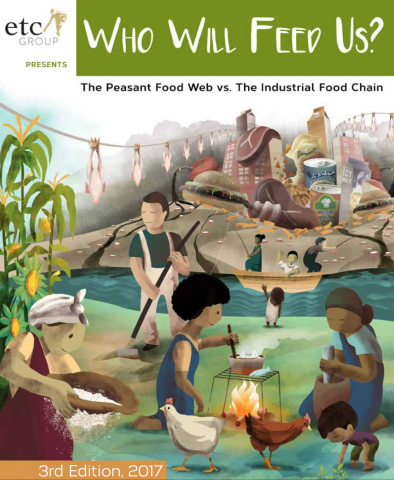Enviado por Dru Oja Jay el

We are told that it is big agribusiness, with its flashy techno-fixes and financial clout, that will save the world from widespread hunger and malnutrition and help food systems weather the impacts of climate change. However, a new report from ETC Group shows that in fact, it is a diverse network of small-scale producers, dubbed the Peasant Food Web, that feeds 70% of the world, including the most hungry and marginalized people.
Drawing on a wide variety of sources, the report concludes that it is the Peasant Food Web that has the diversity, resilience, and light footprint needed to successfully adapt to climate change. Global agribusiness, on the other hand, is a major source of carbon emissions, and made vulnerable by genetic uniformity.
The flagship report, Who Will Feed Us?, is a data-driven report full of unexpected statistics that reveal a tale of two food systems. This is the third edition, and most complete synthesis, of a research exercise that we have been undertaking for several years. Who Will Feed Us? upturns common assumptions about who feeds whom in a hungry world threatened by climate change.
Some highlights of the report:
-
Peasants (not food corporations) feed the world: 70% of the world’s population is fed by the Peasant Food Web, using only 25% of resources.
-
Industrial food production fails to feed: Only 24% of the food produced by the Industrial Food Chain actually reaches people – the rest is wasted in meat production inefficiencies; lost in transport, storage and at the household; and diverted to non-food products.
-
Industrial food costs us more: For every dollar spent on industrial food, it costs another 2 dollars to clean up the mess
The theme of World Food Day 2017 is changing the face of migration by investing in food security and rural development. With the right policies, land and rights, peasant-led agroecological strategies could double or even triple rural employment, substantially reducing the pressure for urban migration, significantly improve nutritional quality and availability and eliminate hunger while slashing agriculture’s GHG emissions by more than 90%.
The report is available to download in English (1.4MB, pdf), Spanish and in November 2017, French.
For further information, or to give feedback or new information: whowillfeedus@etcgroup.org.
